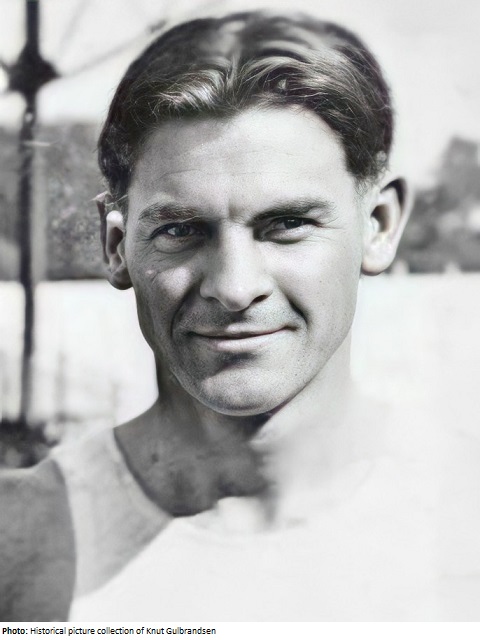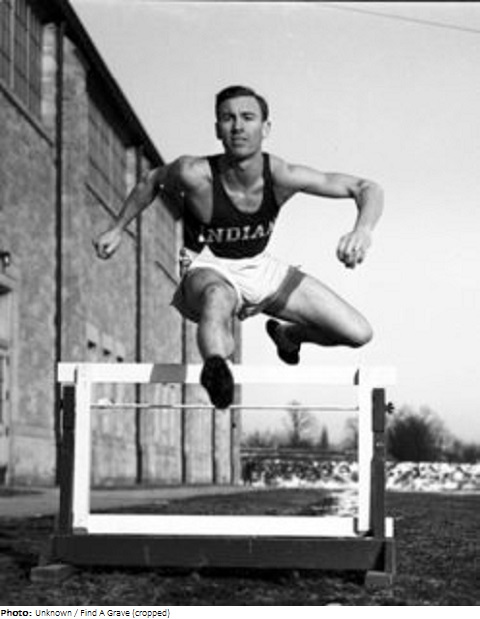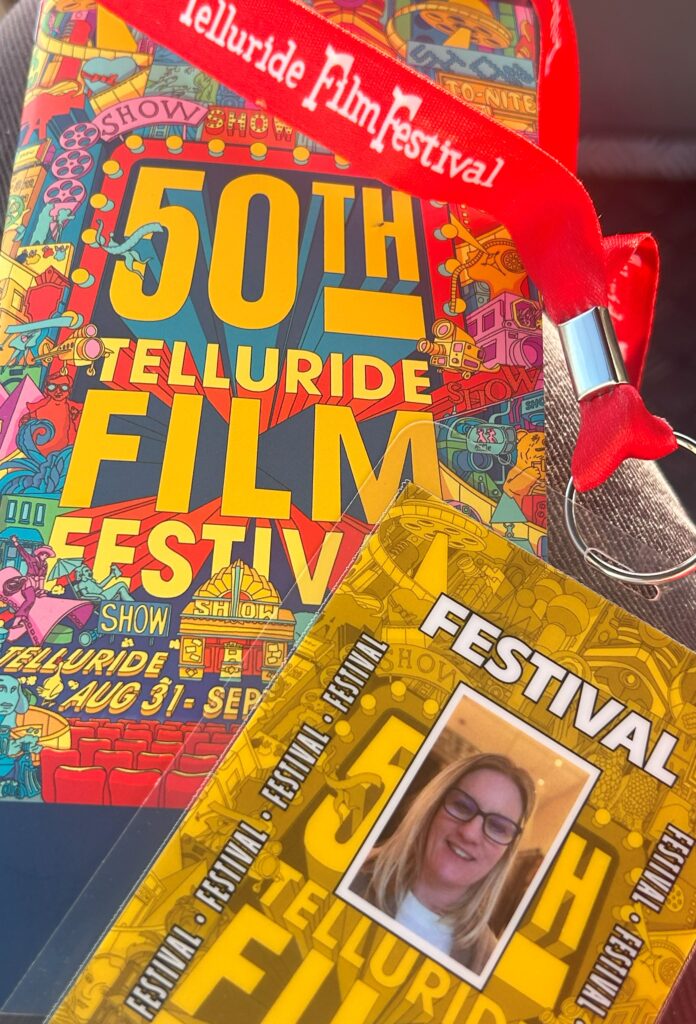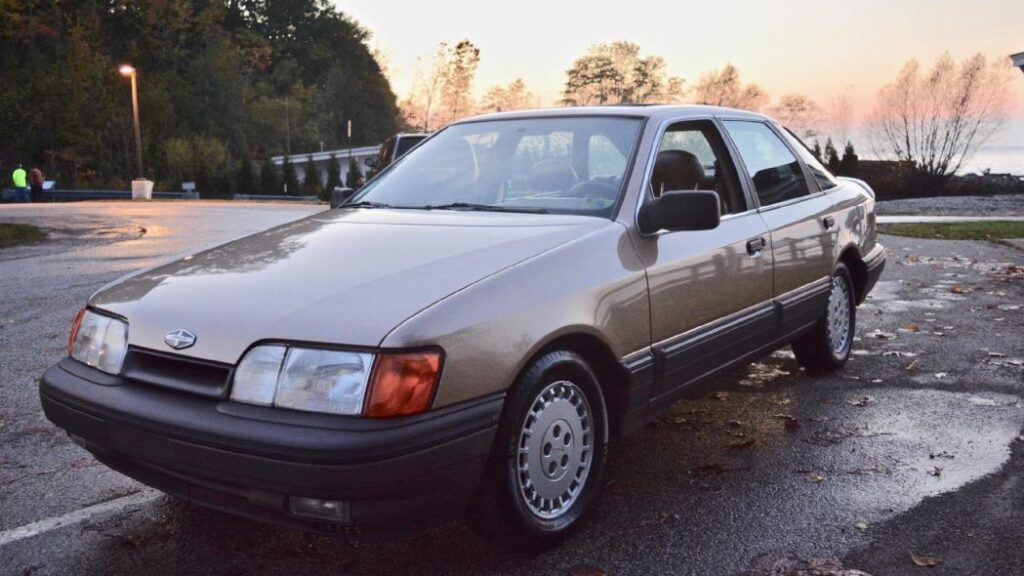I’ve adapted the following from words I shared to celebrate our father’s life.
When my sister and husband (honestly, I can’t remember who joked about it first) suggested we celebrate our dad’s life at the Olathe Ford dealership, we agreed it would be both funny and fitting. If you never met our father, you wouldn’t likely know his obsession with Fords, and Lincolns, and Mercuries, and even the lesser-known German Ford imports called Merkur. I would also bet that if you had met him, you still might not grasp this odd hobby, a preoccupation that took up space in our basement and a kind of religion that sustained him for 70+ years. Like any good midwestern man, he believed fervently, but he also believed in keeping it to himself. Such was the case with all things Ford.
After my father died, I found a folder in his closet that included the window stickers and sales invoices for almost every car he’d ever purchased. Not all of them came from Olathe Ford, but there were at least thirty of them dating all the way to the early 70s including a Mustang II my brother swears is the worst car Ford ever built. (I think he’d forgotten about the Pinto.) My dad had a unique arrangement with his employer of 4-plus decades. After driving a car for a couple years, wracking up 100K miles or so driving the width of Kansas, he would trade it in and get a new one. Add those vehicles to the ones my mother drove, and you’d be amazed that one man owned that many different Fords in a lifetime, but he has the paperwork to prove it.
So, when I started thinking about my memories of our father, they invariably involved a car.
Every Saturday of my childhood, my dad would take me to the downtown library. He would sit in the magazine section reading Car and Driver or Motor Trend while I perused the shelves, first among the children’s books and later in the literature and fiction sections. We drove down the oak-lined streets, past the familiar old homes, and I would hold tight to the treasures I’d found. On Sundays, save for the year when I opted to attend church by myself, my dad would often take me to work with him. He’d catch up on paperwork upstairs while I sat downstairs at the secretary Vickie’s desk and played on what must have been the world’s first Mac computer. I’m sure it was my mother who took me almost everywhere–like sports practices and Girl Scouts, but the drives with my father are the ones I recall, especially when we’d swing through the Ford lot after hours just so he could see what was there.
When I was 11 years old, my siblings long gone and my days as an only child ramping up, my parents decided to take me out of school for a couple weeks so we could see the fall color in New England. My dad wanted to rent a Merkur Scorpio, some Ford product built in Germany and imported to the U.S., probably because he thought it would be fun to see how it drove or he was looking at buying one for himself. This was the first of many driving trips where I took up my rightful spot in the backseat, lounging across the spacious row, no siblings to contend with. We saw all the sights from whales off the coast of Maine to the rolling mountains of Vermont. We stayed in bed and breakfasts, visited my Uncle Bob, walked the Freedom Trail, and most importantly, survived the largest snowstorm to hit the area in 70 years. My father got us through the whiteout conditions, finding refuge in a church basement until the storm had passed. I don’t recall if anyone was ever worried about whether the car could handle it, but I do know I have warm and comforting memories of that entire adventure.
A couple years later, after having reunited with my mother’s side of the family, we drove our own Scorpio (it had passed the test!) to visit her aunt Piny in Kentucky. This car had a digital display and a computer that calculated how many miles you had to empty. Let’s just say my father was an “early adopter” when it came to cars, as long as they were Fords, of course. As we approached the Owensboro exit, and the mileage gauge dropped further, my dad decided he would test out the accuracy of its calculations. Surely, zero had some kind of hidden buffer?! (And, yes, I know this comes straight from a Seinfeld episode, but the Pendletons did it first.) Needless to say, we learned the hard way. When the gas mileage meter dropped to 0 so, too, did the speedometer. A mile or so to go, and we were stranded on the shoulder of the highway. It didn’t take long for a car to stop and pick up our small family–my fuming mother, my embarrassed father, and my terrified self. When I got in the backseat of this strange man’s car, I saw a few religious pamphlets and an umbrella. That flimsy, albeit mostly psychological, protection would have to suffice. The drive to the gas station was short enough we didn’t need it, but then we were left trying to find a gas can to refill the tank. My dad had found someone who had a can at home, but he’d need to ride there with him to get it. Perhaps I would not have been so worried except the stranger was missing an arm. If my childhood of reading and my 1980s, D.A.R.E.-programmed education had taught me one thing it was never to get in a car with a one-armed, strange man. But my dad was braver than that, or at least stubborn enough to prove his foolish obsessions never tumbled into real danger.
That never stopped my father from seeking out a challenge, especially while driving. When I spent a semester in Dublin, my parents traveled outside the United States for the first time to come visit me. Ireland is a small island so driving across it seems like an easy task. We rented a car and set out to drive on the left. The autoroute across the center of the country was simple enough to navigate, but the West of Ireland, the real Ireland, poses tight turns, narrow roads, and low rock walls inching in just below the eyeline of the driver. I’d already attempted to drive these parts weeks earlier, and my roommates and I managed an accident while crossing the street from the car rental place and clipped a couple other parked vehicles in small towns. I knew the hazards of Irish roads designed for sheep and cattle, cars are just a nuisance on this classic way of life. But true to my father’s nature, he believed driving a manual transmission would be simple enough, and he’d never driven a car he couldn’t handle. My friend Brian, who was also studying abroad at the time, joined us for this tour and famously told his own parents he wasn’t sure he’d make it back alive. While my mother always complained of my father’s driving, I’d never noticed until the three of us witnessed his gleefulness at trying to corner a prehistoric road at 40 mph while dodging actual sheep!
By the time we made it to Paris, we thought returning to the right side of the road would prove easy enough. Of course, France offered its own hosts of challenges from the start as we entered a knot of cars tangled at an 8-way intersection, my dad frozen at the wheel while I attempted to read the map and the non-existent street signs. After 20 minutes of honking and yelling and no moving, a Frenchman decided to take matters into his own hands, jumping into the heart of the knot and beating on cars to “Allez!” as the strands began to unwind. The midwesterner, used to his grid of streets and logically numbered avenues, came face-to-face with old-world, civil engineering, and he didn’t like it. Lucky for all of us, we were headed to the peripheral highway and then driving south onto the toll road, something as close to the Kansas Turnpike as we were gonna get in Europe. After some miles and some getting used to the sticker shock of French tolls and European diesel, my dad spotted a sign for the Golden Arches. Is there no more familiar sight in the world than a McDonald’s? Finally, he thought, I can get a real cup of coffee!. We pulled off the highway into a rest stop, and he went to order the largest black coffee he could find. My father didn’t go for cream and sugar and all that crap. He wanted volume, and he wanted it dark. Surely, the “McDo” would come through for him. But it was as if the gods had planned this moment of amusement specially for my mother and me when my father emerged from the fast food joint with the tiniest, cutest cup of McDonald’s coffee you had ever seen. Imagine taking the classic styrofoam coffee cup and rendering it into an espresso version. The disappointment on my dad’s face said it all. The next time someone tells you the French make the best cafe, just remember at least one American was not impressed.
I also remember a few fights with my father over cars. In the last couple months of his life, the tables were turned, and we argued over whether he should be driving himself to and from dialysis in the wee hours of the morning, but every other disagreement always centered on what car I was allowed to drive. When I graduated from college, my father had just replaced his used company car, a candy-apple red Taurus SHO (if you don’t know, that stands for Super High Output as in the engine’s power), and gotten himself something brand new. This was not the first time my dad had bought one of his old company cars, having purchased an old Mercury Cougar for my brother to drive when he finished college. He had already declared he was selling the car I’d driven in college (the Scorpio!), and I had already proclaimed I was moving to Denver, hoping to find a teaching job. So, I thought it made sense–I’d just get the Taurus. But, my father refused. Too fast. Too nice. Too red. He preferred I be saddled with my first set of car payments like all the other working stiffs. Maybe he thought it would teach me a valuable lesson, but all it taught me was how pissed I was that my brother, not I, could buy it and drive it. So, when it came time to look at new cars, I knew the best way to register my anger would be to consider a non-Ford car, and not just any non-Ford but that upstart, GM-built Saturn. Remember Saturn, the different kind of car company? Well, when you worship at the altar of Ford, the birthplace of cars and car companies, you don’t want nor do you need something “different.” For days, he refused to take me to the dealership, but I’d just been offered my first job and I was moving to Denver in a couple weeks. He relented, but he didn’t like it. He was nice enough to the salesperson–I mean it’s not like we were looking at Hondas–and no one had to suffer his complaints about the interior or the handling because they let us test-drive on our own. But when we finished kicking the tires, we drove back across the highway to check out the competition at Olathe Ford. And if you couldn’t guess, I signed the paperwork that afternoon for a red, four-door, manual transmission Ford Escort. I thought my $250 a month car payment was going to bankrupt me on my new teacher salary, but it was mine and my dad was pleased.
I hate to admit it, but I’ve never driven anything but a Ford since. Even better, I’ve never bought a car anywhere but Olathe Ford. Say what you will–yeah, I know the joke about “Found On Road Dead”–but I do see a difference. Maybe my preference is just colored by the legacy of my dad, but I also know it could have been a helluva lot worse.





